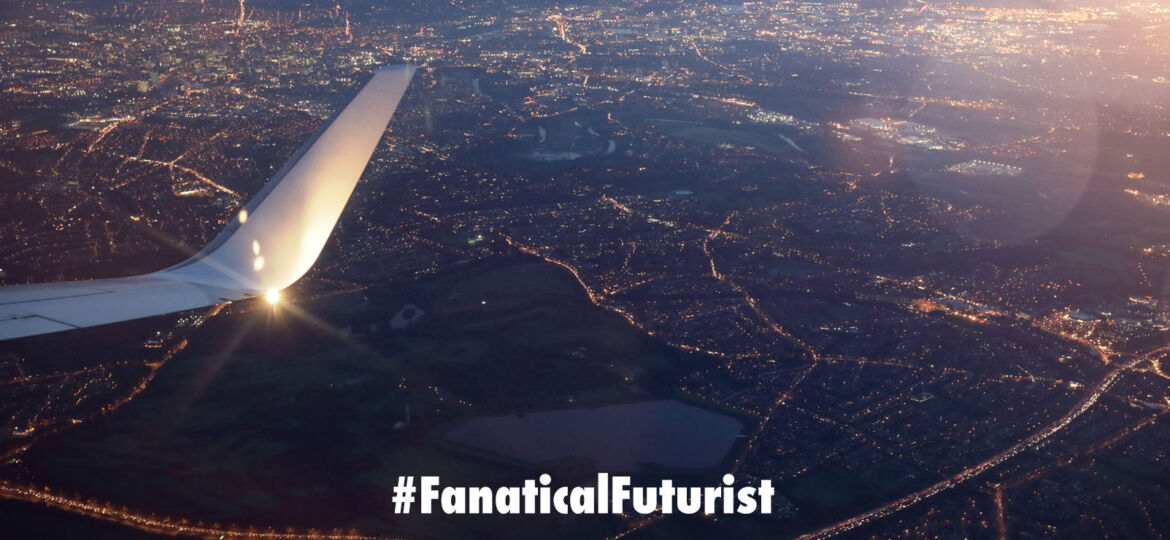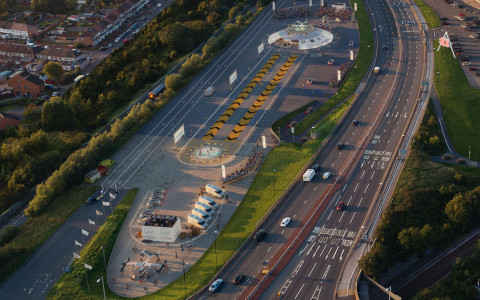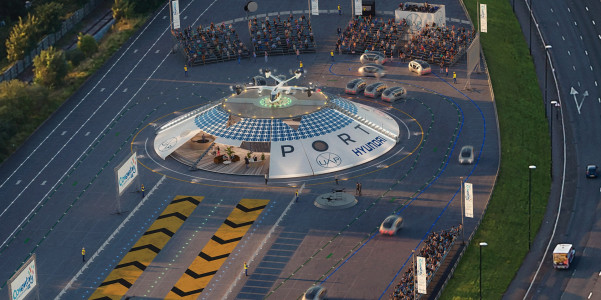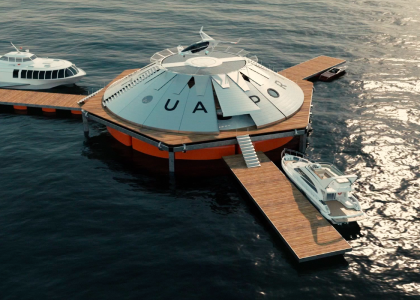
WHY THIS MATTERS IN BRIEF
Urban traffic congestion is clogging and polluting cities so some companies are looking to the skies.
 Love the Exponential Future? Join our XPotential Community, future proof yourself with courses from XPotential University, connect, watch a keynote, or browse my blog.
Love the Exponential Future? Join our XPotential Community, future proof yourself with courses from XPotential University, connect, watch a keynote, or browse my blog.
A year or so after Uber ran a competition to design the world’s first skyports the UK’s own first air hub for flying taxis and autonomous delivery drones is to be built in Coventry, with the backing of the UK government, in the biggest sign yet that UK policymakers are throwing their weight behind this high-tech transport solution, and cities are increasingly starting to agree deals with urban aviation companies. The announcement comes the same week that Lilium, the German flying taxi startup, announced a deal with Ferrovial, the Spanish infrastructure operator, to build a network of 10 vertiports in major cities across Florida in the US.
The Coventry hub, built by Urban Air Port, a UK-based startup, is expected to be operational by November later this year, and will demonstrate how a hub for flying taxis, drones and other urban aviation vehicles could fit into a city transport system.
“Air hubs are the missing piece of the [flying taxi] puzzle,” says Ricky Sandhu, founder of Urban Air Port. “There has been a lot of money going into the flying vehicles but the infrastructure has to come first. The flying taxis have to have somewhere to take off and land from.”
Coventry was happy to test out the concept because the city council hopes that flying electric vehicles could be a way to cut down on both congestion in the city and CO2 emissions, says Sunil Budhdeo, transport innovation manager at Coventry City Council. Like other UK cities, Coventry has a statutory obligation to reach “net zero” for carbon emissions by 2050.
“During the Covid pandemic we’ve seen a huge uptake in parcel deliveries and that is creating a lot of congestion in itself. Solutions like these could be a way of alleviating those problems,” said Budhdeo. Although he is braced for some citizens having concerns about noise and privacy, Budhdeo believes that the benefit of getting traffic off the roads would outweigh these.
The urban air hub will sit alongside projects such as electrifying all city buses by 2025 and building an electric light tram network for the city. Coventry has also been one of the cities that took part in the UK Department for Transport’s electric scooter trials, as the UK deliberates legalising their use.
“Coventry used to be the epicentre of the UK motor industry, and it has a huge legacy of being at the forefront of transport. We want Coventry to be seen as a pioneer in new technologies and so we are saying that we will provide you with a playground if you bring your toys,” Budhdeo said.
The urban air hub looks something like a flying saucer, with a landing pad on top of the building and areas for passengers — including a cafe — underneath. It is designed to be modular, and light so it can be built almost anywhere — on rooftops or even floating offshore, said Sandhu, a former architect who led projects like the construction of the Qatar Airways airport expansion in Doha while at Foster + Partners.
Urban Air Ports is planning to build more than 200 urban air hubs like this over the world in the next five years. Sandhu says the company is getting enquiries from potential customers in the US, Middle East and Asia.
“China is going to be a big market for us,” he says.
NASA has predicted that urban air mobility in the US alone could be worth up to $500bn in the near-term, but lack of infrastructure is proving a significant barrier to market growth.
Urban Air Port, which has raised $2m so far from the UK government and Hyundai is currently trying to raise a $6m Series A round to help fund this expansion.
The funding for urban air infrastructure projects like these has so far been extremely modest compared to the money being poured into the flying taxi companies — Lilium has raised some €342m so far, while Volocopter has raised €160m. In contrast Skyports, another UK-based urban airport developer, which built a prototype passenger hub for urban air travel in Singapore in 2019, in collaboration with Volocopter, raised an $8m Series A round in 2019.
“Investors find the vehicles sexier but we have to shift that perspective a little. You need the infrastructure too,” said Sandhu.
When the Coventry hub opens there won’t be any actual flying taxis taking off — the first such services aren’t scheduled to begin until 2023 at the earliest. Companies like Volocopter and Lilium are only now beginning to perform test flights to gain certification from aviation authorities. Urban Air Ports’ partner Hyundai, which is building its own eVTOL aircraft, does not expect to be doing commercial flights before 2028.
However, Sandhu says the hub could be used by drone delivery companies like Amazon — discussions with drone delivery operators are underway. With one of Amazon’s biggest UK distribution centres in Coventry — and the city situated conveniently in the middle of the country — there is scope for developing the air freight side while waiting for flying taxis to arrive.
And if nothing else, the air hub will operate a cafe, where people can get a feel for what an urban airport of the future might be like. This is important, says Sandhu, to get the public used to the concept. Urban air transport could face a long battle for acceptance, with many people worried about noise and safety if the skies above their cities become busier.
“It can help to make people feel comfortable with the idea, and to make it feel normal to have this kind of infrastructure in the city,” he said.




















